'I could do a better job anyway' Why one mum chose homeschooling for her daughter
'I feared that the institutionalism of schools would dull her innovation'
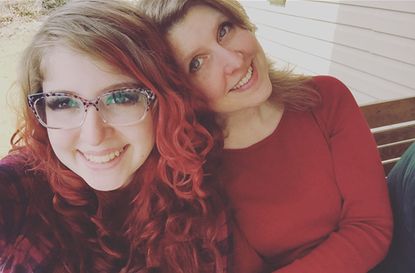

When it comes to thinking about school options for our little ones, homeschooling isn't usually something many parents consider. But with the recent news that the number of home-taught children in the UK has risen by 65% between 2009-15, it's clearly a choice that is growing in popularity.
Jimmie Lanley works from home as co-owner of iHomeschool Network, a social media company and publisher of digital guides such as The Big Book of Homeschool Ideas.
After many years of homeschooling her daughter, Emma, she's somewhat of an expert on the subject, and is preparing Emma for her final year of school.
Here, she shares her experience of homeschooling her daughter, as well as her advice for any other parents who are considering the same path.
'Why I chose homeschooling for my daughter'
I originally chose to homeschool my daughter because I was living abroad in China when my daughter would have entered nursery school. Private, English-speaking schools were too costly, and I felt I could do a better job anyway. Homeschooling was a great fit for living abroad because it gave us the flexibility to travel at will. By age 11, my daughter Emma was bilingual (Mandarin and English) and had visited six different countries in Asia.
When we moved back to America and finally had the option to use public schools for Emma starting Year 7, she and I both made the choice to continue her education at home. We both agreed that public school would be too constricting and wouldn't allow for advanced pursuit of her passions - art and foreign language. Emma is a creative person, and I feared that the institutionalism of schools would dull her innovation and maybe even damage her free-spiritedness.
As it turned out, Emma needed a spinal fusion (for scoliosis) when she was 12. Homeschooling turned out to be the hero once again when we had the flexibility to rearrange her schooling around surgery and the long recovery.
GoodtoKnow Newsletter
Parenting advice, hot topics, best buys and family finance tips delivered straight to your inbox.
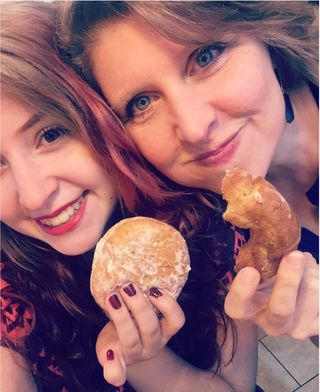
Over the secondary school years, Emma and I revisited the decision to homeschool periodically. I wanted to be sure that she was content with her self-directed education. Emma is now in Year 13, and she wholeheartedly agrees that homeschooling was (and is still) the best option for her.
The main benefit of homeschooling is flexibility both in your schedule and your course of study. As a homeschool parent, you choose the topics, the curriculum, and the methods. The younger the child, the more freedom you have. As they get older, you do have to adhere to your country's requirements for secondary school, but there is still much leeway in exactly how your teens achieve those mandatory levels. You can customise the education for your child's special needs and for her passions. Any group learning environment, whether private or public, can never afford the level of customisation you can offer as a homeschool parent.
As far as drawbacks, sometimes homeschooling is lonely - for mum and for child. My daughter is an only child, so I took the socialisation issue very seriously. Seeking out and creating opportunities for her to engage with peers was always a high priority. Homeschool mums (like all stay at home mums) can feel isolated and unappreciated at times. But just as I made it a priority to provide Emma with socialisation experiences, I, too, invested in homeschool support groups whether in person or online.
I prefer to have a dedicated homeschool area where all of our books, learning tools, and school supplies are neatly stored - a place where we could spread out and make messes. Wherever we lived over the years, I created this space. Sometimes it was a whole room; other times it was merely a shelf beside the kitchen table.
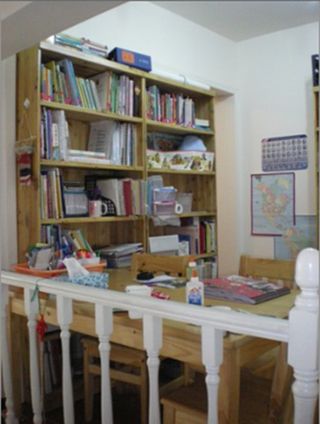
The study area where Emma and Jimmie work
Before secondary school, I didn't have to assign grades, so I didn't use tests at all. Instead of tests, I opted to evaluate learning through narration, either oral narration (telling back) or written narration (notebooking).
Teaching my daughter how to learn has always been more important to me than merely teaching her facts. Although Years 3-5 required much one-on-one instruction, as my daughter matured, she took more and more responsibility for her studies. At this point, she's in Year 13, and I serve only to coach and to pay for school materials. Her independence means that I can work full time from home.
Because she's a fully independent learner, I don't worry about her success in university. She's going to start way ahead of her peers in time management and self-motivation.
My advice to parents who want to start homeschooling their kids
If your children are young, jump into home education by letting their interests guide the way. Read lots of great books, explore nature, do crafts, travel and take trips, and play games! You truly do not need a formal curriculum at the lower levels. All you need is a child's natural curiosity and the world to explore.
As they get older, do some professional development as a homeschool parent. Research different homeschool styles, philosophies, and methodologies. The label you choose isn't as important as understanding why you make the curriculum and instructional choices you do.
Don't become paralysed by the thousands of homeschool curriculum options. Read reviews, ask other homeschool moms, and then simply pick something. As long as you've done some initial research and narrowed down your options, whatever you choose is going to be effective. You aren't going to ruin your child's future career path by selecting the wrong science curriculum!
Relax and enjoy! Trust the process of homeschooling, and your child will have a great education no matter what you decide.
Trusted, informative, and empathetic – GoodToKnow is the ultimate online destination for mums. Established in 2007, our 15-year-strong archive of content includes more than 18,000 articles, 1,500 how-to videos, and 7,000 recipes.
-
 I tested the Lakeland Dual Basket air fryer and it made midweek family cooking a breeze
I tested the Lakeland Dual Basket air fryer and it made midweek family cooking a breezeYou can’t go wrong with the dual basket air fryer by Lakeland complete with easy-view windows to ensure burnt food is a thing of the past…
By Jessica Dady Published
-
 Reframing one simple habit could get your sex life back on track after having a baby, new research shows
Reframing one simple habit could get your sex life back on track after having a baby, new research showsMany parents struggle to get their sex life back on track after having a baby, but new research has shown how one simple habit could make all the difference.
By Ellie Hutchings Published
-
 When will A-Levels be scrapped? Everything to know about the Advanced British Standard
When will A-Levels be scrapped? Everything to know about the Advanced British StandardEverything you need to know about the new qualifications that are set to replace A-Levels.
By Ellie Hutchings Published
-
 When do kids go back to school after the Christmas holidays? 2024 school holiday and term dates
When do kids go back to school after the Christmas holidays? 2024 school holiday and term datesThe key dates that you’ll want to pop on your calendar
By Ellie Hutchings Last updated
-
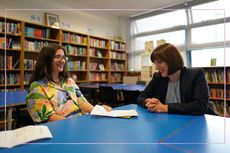 How to appeal A Level results and when does clearing open?
How to appeal A Level results and when does clearing open?Find out how to appeal A Level results and when does clearing open with this helpful guide to get you through results day
By Grace Walsh Published
-
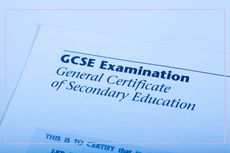 GCSE results 2023: When are GCSE certificates issued?
GCSE results 2023: When are GCSE certificates issued?GCSE results are a nerve-wracking time, but once out the way you might find yourself asking when are GCSE certificates issued?
By Ellie Hutchings Last updated
-
 What to expect on A level results day - a parents guide
What to expect on A level results day - a parents guideWe explain what to expect on A level results day, how to understand their results and what to do if they didn't get what they wanted
By Gemma Chandler Published
-
 When do kids break up from school? Summer holidays 2023
When do kids break up from school? Summer holidays 2023It's the final term before the long summer break!
By Emily Stedman Last updated
-
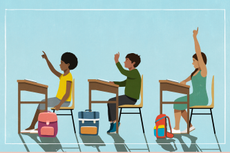 How to appeal a school place: what to do if your child doesn’t get the school you wanted
How to appeal a school place: what to do if your child doesn’t get the school you wantedGetting your child into the school you really want for them can be a nail-biting time for parents. Here's how to appeal if your child doesn't get in...
By Emily Stedman Published
-
 179 fantastic facts for kids to really blow their mind - from sharks and cats to space and tornadoes
179 fantastic facts for kids to really blow their mind - from sharks and cats to space and tornadoesDazzle and amaze little ones with these mind-blowing facts… They’re so good they’ll leave grown-ups speechless too!
By Joanne Lewsley Last updated